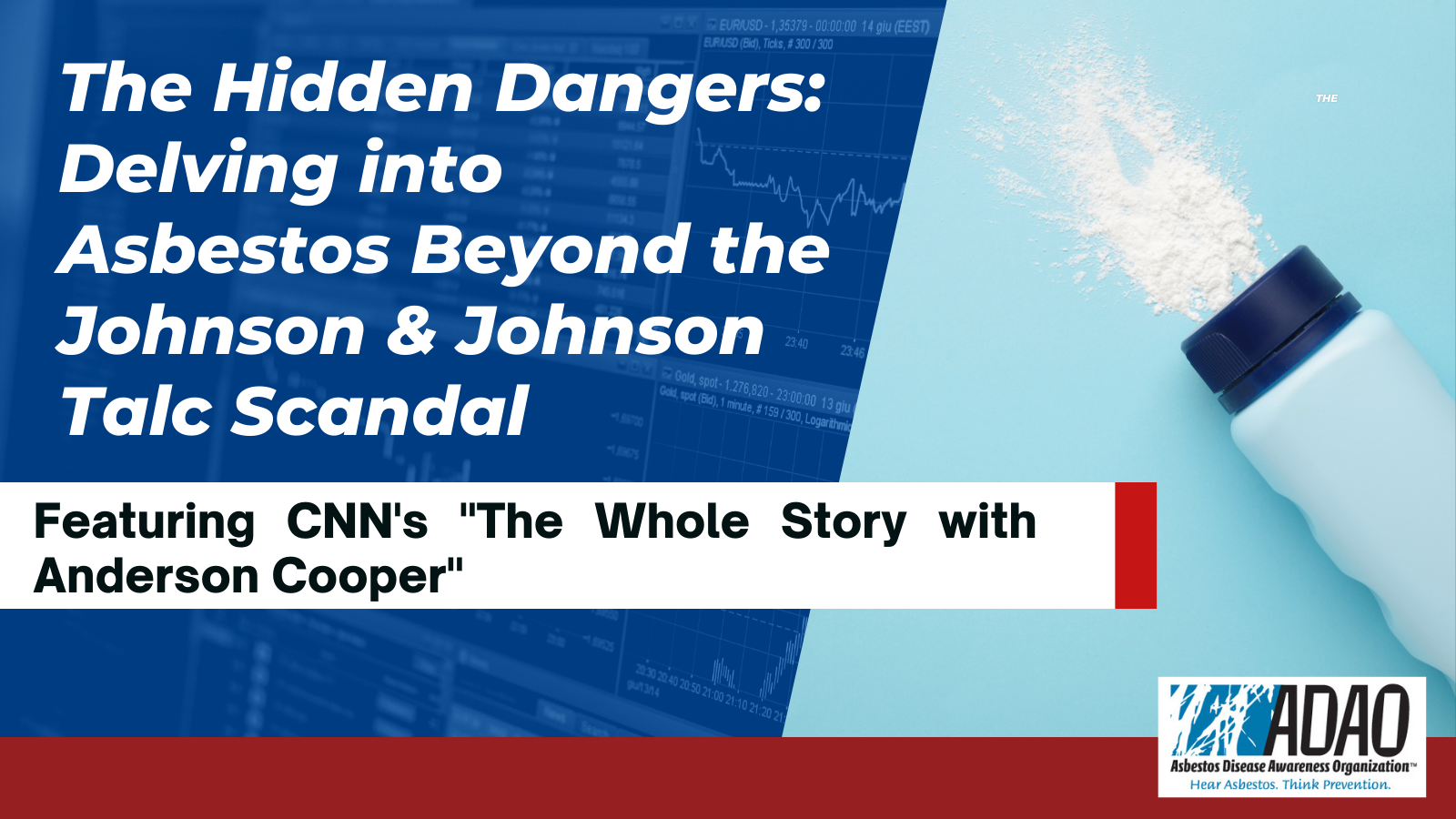Posted on May 16, 2023
Last Sunday, CNN’s captivating new Sunday primetime series, “The Whole Story with Anderson Cooper,” delved deep into the claims made against Johnson & Johnson regarding their talc baby powder. In the episode titled “Shaken: Baby Powder on Trial,” CNN Chief Investigative Correspondent and Anchor Pamela Brown presented exclusive reporting on the allegations linking the now-discontinued product to cancer. This thought-provoking investigation shed light on Johnson and Johnson’s controversy and the far-reaching implications for consumer trust.
The Johnson & Johnson talc scandal serves as just the tip of the iceberg in the greater asbestos public health crisis. Shockingly, asbestos continues to be imported into the United States, posing significant risks to workers and consumers alike. Each year, an estimated 40,000 people in the U.S. die from preventable asbestos-related diseases. This alarming reality underscores the urgent need for action and raises critical questions about corporate accountability and public safety.
Johnson & Johnson’s Iconic Legacy and the Talc Baby Powder Scandal:
As an American institution worth over 400 billion dollars, Johnson & Johnson holds a prominent place in the corporate world. Renowned for household brands such as Tylenol, Band-Aid, and Neutrogena, the company’s talc baby powder became an iconic product trusted by countless families. However, when allegations emerged suggesting the presence of cancer-causing asbestos in the powder, Johnson & Johnson vehemently denied these claims. The company faced nearly 40,000 lawsuits related to these allegations, putting its reputation and accountability under scrutiny.
The Power of Personal Stories:
In this compelling investigation, Pamela Brown presented the heart-wrenching stories of several women who sued Johnson & Johnson following their cancer diagnoses. Their experiences made the profound impact of the talc baby powder controversy evident. Brown also provided a balanced perspective by interviewing attorneys representing both the plaintiffs and Johnson & Johnson. Additionally, she conversed with Senator Dick Durbin, Chair of the Senate Judiciary, to discuss the company’s response to the allegations.
The Erosion of Trust and Consumer Perception:
Brown highlighted the significance of consumer trust in the brands and products they relied on. Johnson & Johnson, with its strong brand recognition, had long been perceived as a trustworthy company. The widespread distribution of their talc baby powder in hospitals further solidified the notion of its safety. However, this investigation revealed the growing uncertainty and skepticism surrounding the brand in the wake of the controversy. The impact on consumer perception served as a cautionary tale for the broader landscape of consumer trust in corporate entities.
“The Whole Story with Anderson Cooper” continues to delve into meaningful stories, unearthing truths and providing in-depth analysis. In the episode “Shaken: Baby Powder on Trial,” Pamela Brown’s investigative reporting raised awareness about the claims against Johnson & Johnson and the potential impact on public health. As the controversy unfolded, the series prompted many to question the trust we place in beloved brands and emphasized the need for transparency and accountability in corporate practices.
This story serves as a powerful reminder that there is no safe or controlled use of asbestos. The dangers of asbestos exposure are well-documented, and swift action must be taken to protect public health. The United States should pass the Alan Reinstein Ban Asbestos Now Act expeditiously. This amendment to the Toxic Substances Control Act (TSCA) would enact comprehensive legislation to ban all asbestos fibers in all areas of continuous use.
The Alan Reinstein Ban Asbestos Now (ARBAN)Act is crucial to ensuring a healthier and safer future. By prohibiting asbestos in any form, we can prevent unnecessary harm and save countless lives. EPA has regulatory powers to prohibit commercial asbestos imports and use; however, the current Chrysotile Asbestos Part 1 Rule only bans one fiber and six conditions of use. A landmark step forward, but not a ban, and the industry is already posturing to sue EPA. ARBAN, however, is a testament to our commitment to prioritize public safety and prioritize the well-being of workers, consumers, and communities, and will ensure that industry has a much harder time bringing asbestos back into the lives of Americans.
It is time for the United States to join the more than 60 countries that have already taken decisive action to ban asbestos. ARBAN will lead the way in protecting our citizens from the hazards of asbestos and send a clear message that the health and well-being of our people are of utmost importance.
Let us seize this opportunity to enact meaningful change and ban asbestos once and for all. The time for action is now, and together we can create a future free from the dangers of asbestos exposure. Some important opportunities for you to take action are listed below. ADAO is looking forward to sharing its concerns about the negative effects of asbestos in cosmetics and consumer products, and you should too.
Linda Reinstein
Social Networks
Important Dates to Remember
- May 18, 2023 (6:00 pm EDT): Deadline to register if you wish to speak at the meeting. Each speaker will be limited to approximately 3 minutes; the length of time may vary depending on the number of registered speakers.
- May 22, 2023: Deadline to submit all presentation materials, in PDF format, to MoCRAGMPMeeting@fda.hhs.gov, for persons selected to speak at the meeting. We ask that all presentation materials also be submitted to Docket No. FDA-2023-N-1466 by June 1, 2023.
- June 1, 2023: Deadline to register to attend the listening session; registration may be performed at any time before or during the listening session.
- July 3, 2023: Deadline to submit comments to Docket No. FDA-2023-N-1466.
